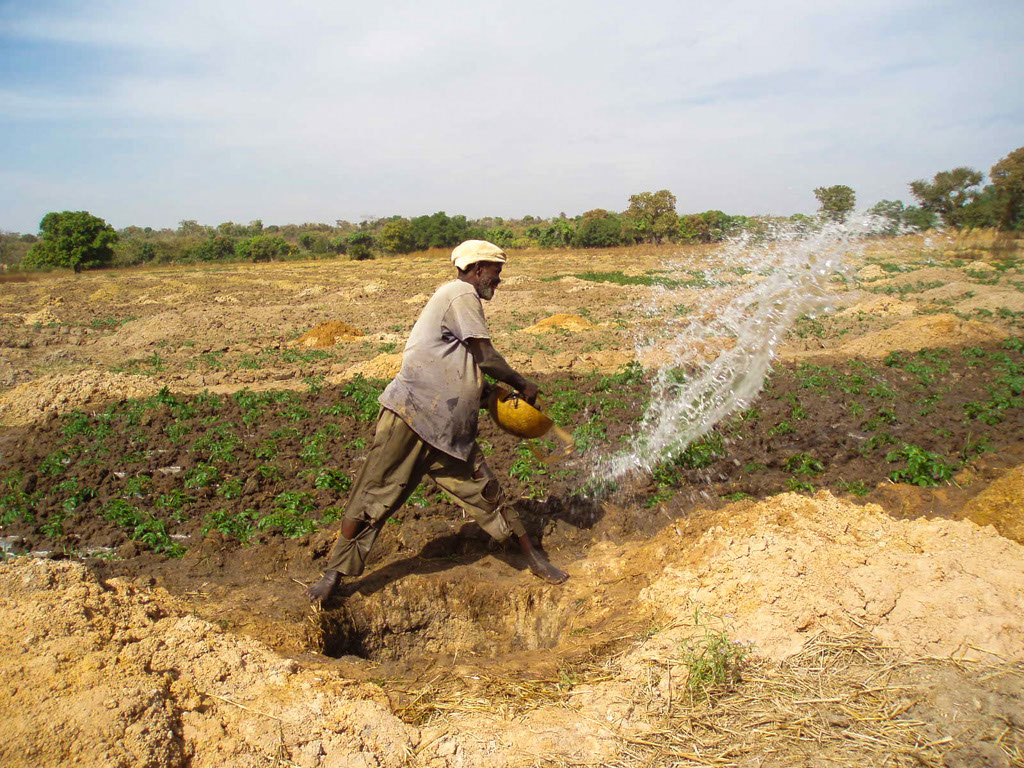In Mali, food production is and will continue to be severely limited as long as farmers do not have access to water for irrigation. So far, expansion of new irrigation technologies and practices is slow. One ILSSI researcher went to the field to investigate why.
While Mali shows potential for solar irrigation in some areas, it also differs from other countries in which the Feed the Future Innovation Lab for Small Scale Irrigation (ILSSI) works. Much of the country falls within arid and hyper-arid agro-ecological zones, meaning that it is very hot and dry. As the U.S. Government’s Global Food Security Strategy for Mali highlights, the people of Mali are also highly vulnerable to climate change and variability.
One ILSSI scientist, Ephraim Nkonya, who is a fellow at the International Food Policy Research Institute (IFPRI), met with key irrigation stakeholders in Mali in December 2019 and again in January 2020. His field visits provided insights on challenges to expanding the use of small scale irrigation in the country.
Demand exceeds supply
Nkonya visited the IPRO IRRIGAR project in the city of Sikasso in southern Mali, which has constructed 50 micro dams over the past couple years. The dams create small reservoirs, which can provide water for irrigation, and are part of the project’s efforts to strengthen food security and nutritional status among local communities by increasing and diversifying agricultural production.
Once a dam is in place, a development project funded by the Deutsche Gesellschaft für Internationale Zusammenarbeit (GIZ) – the Programme d’Appui aux Sous-secteurs de l’Irrigation de Proximité (PASSIP) – provides farmers with agricultural extension services and technical support, alongside public agencies. While a sought-after solution to the general lack of water for irrigation, the demand for new dams far outpaces the ability of the project to build more, according to local stakeholders.
Slow adoption of new technology

In addition, bucket irrigation remains a key water lifting and application technology in this part of Mali, despite investments in irrigation by various donors and partners. Nkonya saw farmers irrigating using buckets and calabash bowls to lift water.
However, as past ILSSI and other research has shown, this form of irrigation, which is also widely practiced in northern Ghana, is highly time intensive. Manual approaches to lifting and applying water on fields limit the potential for expanding irrigation. Nkonya also observed incipient adoption of motor pumps, which require much less labor, but only by men. Women dominate rice production in the area, but only irrigate manually, such as with buckets.
Further research needed
To get a better sense of what is holding back the expansion of small scale irrigation in Mali, Nkonya met with a wide range of stakeholders. These included USAID, partners from the Institut d’Economie Rurale (IER), the Deputy National Director of Rural Engineering, who oversees Mali’s small scale irrigation program (PNIP), and the Projet Initiative de Renforcement de la Résilience par l’Irrigation et la Gestion Appropriée des Ressources (IPRO IRRIGAR) based in Sikasso.
Future field research by ILSSI and its partners will further probe why a gender gap exists when it comes to adoption of various irrigation practices in Mali as well as investigate the linkages between household water security and water availability for food production.


